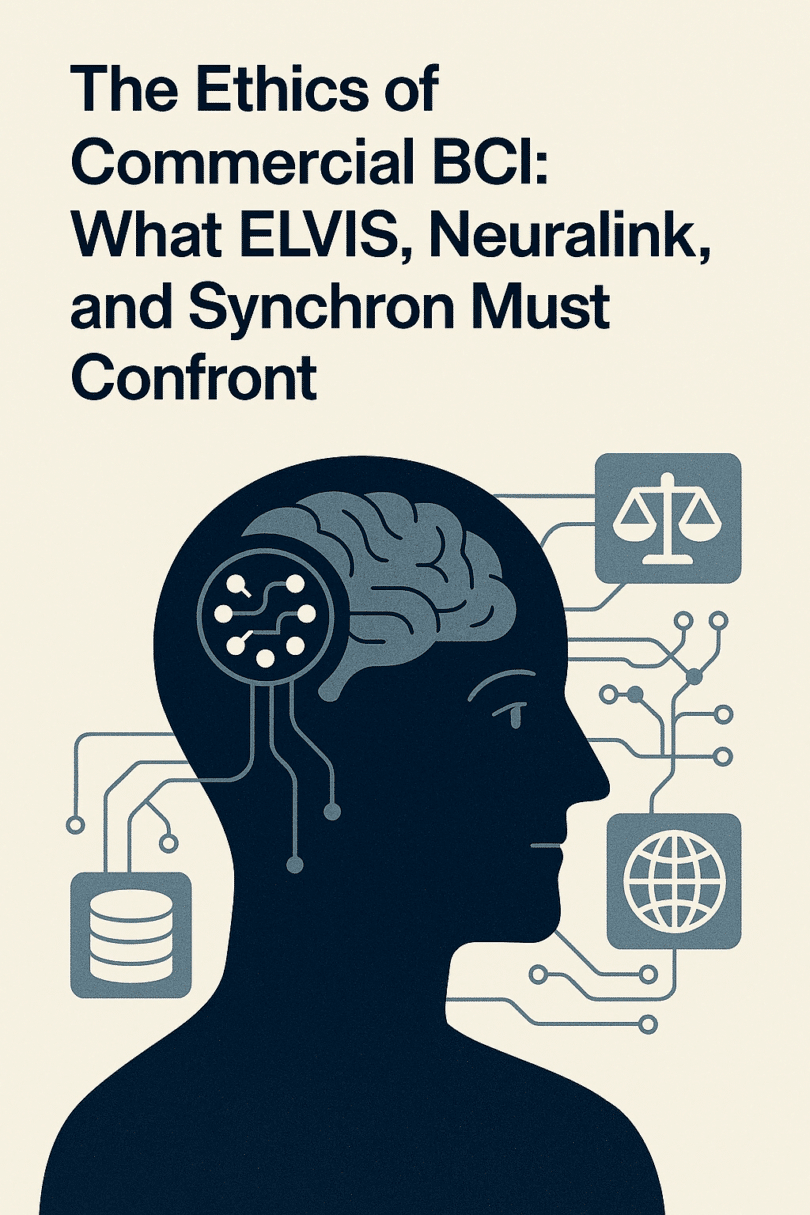Introduction: The BCI Ethics Frontier
As brain-computer interfaces (BCIs) move from lab to market, BCI ethics questions become unavoidable. Who owns your thoughts? What happens when neural data is commodified? And how do we protect autonomy when machines read the mind?
This article explores the ethical challenges faced by three major players: ELVIS Technologies (Russia), Neuralink (USA), and Synchron (USA/Australia). Each is pioneering breakthroughs—but with those come responsibilities.
1. BCI Ethics – Informed Consent and User Autonomy
Consent in BCI is uniquely complex. Patients or users must understand:
- What data is being collected
- What the device will control
- Whether their thoughts are stored or transmitted
Neuralink uses advanced robotics and claims high levels of user control—but little is publicly known about its consent frameworks. Synchron, working with academic hospitals, follows strict IRB (Institutional Review Board) protocols. ELVIS, operating largely in Russia, has no published informed consent procedures in international journals.
Insight: Synchron currently demonstrates the most transparent ethical safeguards around user autonomy.
The challenge deepens when BCIs are offered to individuals with cognitive impairments. Determining their capacity to provide meaningful consent requires additional layers of protection, counseling, and potentially third-party advocacy.
2. Neural Data Ownership and Privacy
One of the most critical ethical issues is: who owns the data?
- BCIs can capture not just movement signals, but emotions, impulses, and intention.
- If stored or transmitted, this data could be accessed by third parties.
Neuralink has not detailed how it will secure user data or if it will commercialize it. ELVIS is opaque on this front, while Synchron has published protocols that prioritize data anonymization and hospital-level security.
Key Concern: In countries without robust data protection laws, like Russia or even parts of the U.S., there is a risk of neural surveillance if safeguards are not enforced.
The commodification of neural data also raises long-term questions. Could brain data be bought, sold, or used to influence behavior? The lines between medical information, behavioral data, and marketing insights may blur.
3. Enhancement vs. Therapy: The Line Between Help and Hype
While all three companies currently target clinical needs (paralysis, blindness, hearing loss), the potential for cognitive enhancement looms:
- Memory boosting
- Emotion regulation
- Accelerated learning or decision-making
Neuralink openly speaks about long-term goals of merging with AI, which raises philosophical and ethical concerns. ELVIS and Synchron have not promoted enhancement but may face pressures to expand beyond therapeutic use.
Ethical Dilemma: Should BCI companies be allowed to market products that alter cognition in healthy users?
Moreover, enhancement applications could exacerbate inequalities. If only the wealthy can access cognitive upgrades, societal gaps could widen—undermining democratic principles and workforce fairness.
4. Accessibility and Global Equity
Ethics also involves who gets access.
- Will only the rich have access to enhanced cognition?
- Will war-torn or underfunded regions be testbeds for unregulated experimentation?
Synchron, through partnerships with hospitals and public health systems, shows potential for equitable deployment. Neuralink, a private company, may price out most users. ELVIS could become the low-cost alternative for Eurasian markets—but risks using populations with fewer protections as test groups.
Insight: True BCI ethics must prioritize global equity, not just elite performance.
To achieve meaningful ethical equity, companies may need to offer tiered pricing, public subsidies, or global licensing strategies aimed at affordability. Without such plans, BCI could mirror the digital divide seen in internet access.
5. Dual-Use and Militarization Risks
All BCI technologies have potential military applications:
- Cognitive control of weapons
- Mind-to-mind communication
- Emotion detection in interrogation settings
Neuralink and ELVIS have both been associated with national-level innovation programs, which could be leveraged by defense sectors. Synchron, while less publicized in this arena, still operates within geopolitical systems where dual-use is a concern.
Policy Gap: There is currently no global framework limiting the weaponization of BCI technology.
There are growing concerns that the same neural interfaces used for healing could be adapted for surveillance, psychological operations, or combat augmentation. This raises urgent calls for multilateral agreements governing peaceful applications only.
BCI Ethics Conclusion: Toward an Ethical Framework
As commercial BCIs move forward, ethical leadership is not optional. It must include:
- Transparent data policies
- Certified consent frameworks
- Public oversight of clinical trials
- Global norms around enhancement and dual-use
Synchron currently leads in public transparency and research ethics. Neuralink leads in vision, but must clarify data rights. ELVIS must move toward internationally accepted ethical standards to gain legitimacy.
The future of neurotechnology won’t just be shaped by innovation—it will be defined by integrity.
The companies that succeed long-term will be those who align technological breakthroughs with societal trust, public accountability, and a vision for inclusive, ethical deployment. Without a moral framework, the promise of BCI risks turning into peril.
